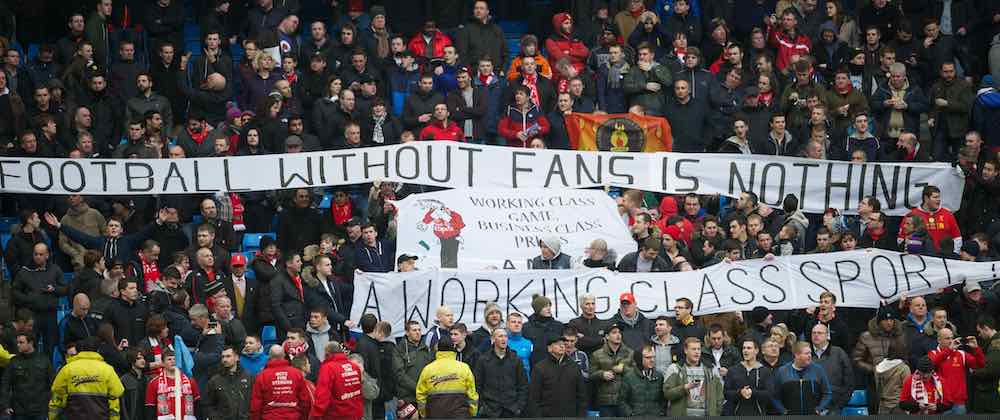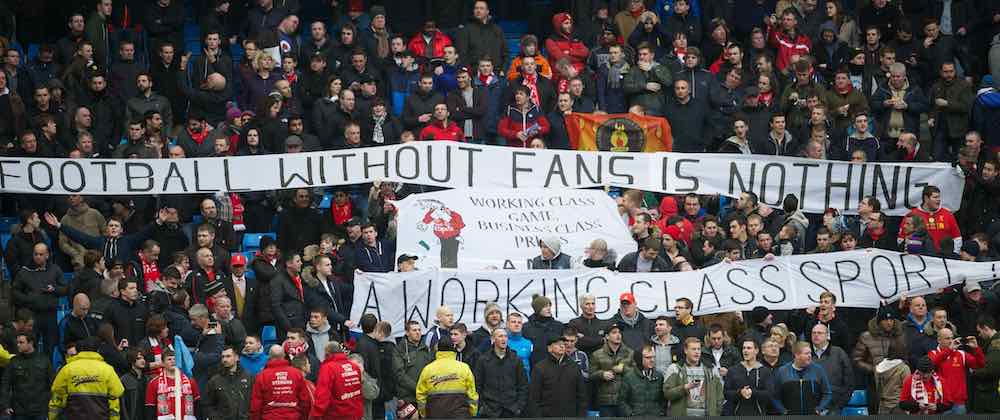Politics as football
This post considers that people often support political parties like football teams. Too much emotion and not enough thinking.

I agree. Football without fans is nothing, fans really do make the games what they are. And football really is a universal language in it's own right.
On the other hand, competitive football can be divisive and emotional; it's what makes it brilliant to watch, entertaining, and intoxicating.
It's also why I watch less and less football, and no longer closely support a team - just isn't my cup of tea. That said, I do still enjoy watching games, and continue to play regularly.
Would we ever want to talk about politics like we talk about football? This post, and those that follow it, argues that this is exactly what lots of people do all the time (myself included).
But let's keep our football and our politics separate and enjoy them both for what they are; let's try to stop mixing them up into some kind of strange Nutribullet cocktail that nobody really enjoys.

The problem
I believe that, far too often, conversations in politics mirror conversations in football: the other side is a team who is stupid, who we should chant at, and the best way that we should understand them is with divisive and emotional language.
This set of posts will build on the simple idea that different political parties view the world differently.
We all live in the same world, but we all see it differently (1). The historian of science Thomas Kuhn notes how new scientific discoveries have changed how people across time view themselves in relation to the world.
Humans were the centre of the world, until it was discovered the earth rotates around the sun, and is one of many planets to do so. Humans were uniquely sacred, until it was discovered how old the world was, how things evolve, and how we all possess an animal nature.
Science or no science, there are lots of cultural reasons that people see the world differently, and these cultural differences come out during scientific research (2).
Differences in politics are often differences in people who are interested in the world, who want to make it a better place, but have different ideas about how to achieve this.
Though it may seam that the other team are stupid - and we talk about them in divisive and emotional language - they may just have a different set of ideas for tackling the same set of problems.
Politics is an emotional subject because it touches on real and sensitive issues that affect all of us. It's for this reason primarily that it's important to have better ways for thinking about and discussing politics.
Emotions are central to life! The neurologist Antonio Damasio has perhaps provided the world with the most convincing evidence of this when he studied people who had brain injuries to their emotional centres (3).
What happens to people with brain damage to their emotional centres? Well, without emotions to guide them, people fall apart and cannot live proper lives.
Emotions are key to living in, deciding about, and taking actions in the world. The goal should never be perfect rationality free from emotion. Cold calculations have their place, but it's probably not in politics.
Emotions, however, really do prevent logical, rational, and critical thinking (4).
These posts are about these kinds of thinking, the logical, rational, and critical, because it's these kinds of thinking that I believe are important - necessary - to discuss politics.
What these posts will attempt to do
They will try to lay out some key differences between those broadly on the left, those broadly on the right, and offer readers a framework for rationally thinking about real political differences, rather than the differences between football teams that pervade how people often discuss politics.
When people talk dirty about the other side, they may do so because they don't have a good understanding about what the ideas of the other side actually are; it's easier - and more fun - to put them down.
The posts, then, will aim to inform readers what the key differences between political parties are, and attempt to answer questions like:
· What are the different ways in which political parties view the world?
· How is it that people come to look on the same problem and suggest different solutions?
· And why is it, exactly, that the other side are just so damn stupid?
It's been said that people should write the kind of thing they would like to read themselves (5). With that in mind, these posts are written because they are the kind of thing I would like to read, and serve as a reminder to myself about how difficult it actually is to listen and talk to people who see the world differently to me, and who may have different ideas about how to solve the same problems.
As the psychologist Jonathan Haidt has convincingly argued: none of us like to feel wrong (6); in fact, we probably all have righteous minds, that will tend to defend our ideas to the last, that likely won't change it's opinion when the facts change, and that divides the world up into binary categories of it's own making - good and evil, home and away, left and right.
END.
You've been reading:
Politics as football.

References
1) Kuhn's The structure of scientific revolutions (1962)
2) Henrich, Joseph, Steven J Heine, and Ara Norenzayan. “The weirdest people in the world?” Behavioral and Brain Sciences 33, no. 2-3 (2010): 61-83.
3) Damasio's Descartes error (2006) (discussed in Haidt's Righteous Mind below)
4) Kahneman's Thinking fast and slow (2011)
5) Kleon's Show your work (2014)
6) Haidt's Righteous Mind (2012)
